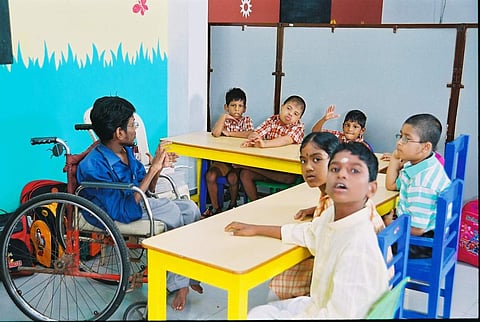

In 1985, Raksha Society established Kochi's first special school and set off on a carefully planned track towards changing special needs education in the state. The not-for-profit organisation focused on addressing the needs of children and young adults with neuro-developmental disorders like Cerebral Palsy, Autism, learning, intellectual and other multiple disabilities. At Raksha, the most important rule is to treat every child as an individual and with the utmost respect. We speak to project coordinator, Elizabeth Joseph about the way education can save the lives of children with special needs. Excerpts:
How did the organisation come about?
We started the organisation in 1985 for children with cerebral palsy. We had established one of the first special schools in Kochi and the parents of children with other disabilities also started approaching us. At present, we work with children who are affected by cerebral palsy, intellectual disabilities, autism or multiple disabilities.
Could you explain the education process that you follow?
The students are trained in rehabilitation centres. This includes a variety of methods. Starting from a few months, we have different projects based on their age. This ranges from programmes like an early intervention programme for students who are a few months old to two years, a pre-school for children aged between 2-6 years and a special school for children aged between 6-18. In addition to this, we have a vocational training centre for students above the age of 18. With students who have Severe/Profound Intellectual Disabilities, vocational training might not be able to help them enough, so we have something like a day home facility for them where they can interact with others. We take members, volunteers and anyone who would like to contribute towards what we do. To support all of this, we have a physiotherapy centre and a language enhancement unit. Another project we have is a teacher training unit in which we conduct a diploma in special education.
What are the most important features of special needs education?
We try to focus on education mostly. But since this is special needs, education alone will not be able to do the job. So we focus on multidisciplinary support like physiotherapy, counselling and language enhancement training. When a new student comes here, we assess them like they do in any other institution. This assessment is by itself multidisciplinary this is done by a psychologist, physiotherapist, social workers and special educators. There is a trained special educator who is specialised exclusively on language. So once they all assess the child, we create a programme that is unique for that child based on what they will require.
How are parents incorporated into the learning process?
The parents are involved throughout this process. Their expectations are our first priority. Obviously, if there is a child who has difficulty walking, they would naturally want for him/her to be able to walk. So we teach them the importance of education in this respect and the special training that we provide. We help them understand that physiotherapy alone will not satisfy the needs of the child. Our programme plans are based on the inputs of the therapists and parents. The needs of the child are prioritised.
What have you learnt through your experience with children over the years?
One major lesson we've learnt through this is that people usually see disabilities as a negative, as though it's a disadvantage. But we've come to learn that even in their disability, there is positivity. Some of our children display exceptional abilities. They have got their own talents and sometimes they do it better than any of us. Some of our kids really enjoy coming over here and they show so much affection towards us. They also bond with other students and form lasting bonds with them. For us, it is all very exceptional when we see it.
What do you believe is urgent going forward?
Something else that we've learnt and realised is the need for an inclusive society. Our idea is not to isolate them here, we want them to be functioning members of society. This is our ultimate aim. There needs to be a lot of attitudinal, physical and emotional changes in the way people deal with those who have disabilities. We need a society without such barriers. Having worked so closely with children who are treated in this way, far too often, this is an urgent need for change that we need to focus on.
How can we bring more focus to early intervention?
Early intervention is something that people understand now. The thing is, the earlier you start this training, it will help develop maximum potential from the students. This is why this is so important. in Kerala, we are actually very advanced in this respect. We have facilities for detection and treatment. What we need to focus on now is the training that comes after that. Another important thing that we need to work towards is training that leads towards economic empowerment. Such facilities and framework and a similar sense of support is very urgent right now.
What other areas do you focus on?
In education, we try to include various elements like art, dance, music and yoga. It is important to have this multidisciplinary approach in order to truly help them. This not just a special school, it is a special setup altogether. We know each and every child. These children are not ordinarily seen as a part of the population. When they study in regular schools as a part of these inclusive education projects, they are able to see a better model. Naturally, their social abilities and skills develop a lot in this circumstance. But the disadvantage of regular schools is that they overlook some critical things when it comes to the children's development. What we try to do is take them outside, make them interact with people and places outside of their comfort zones.
